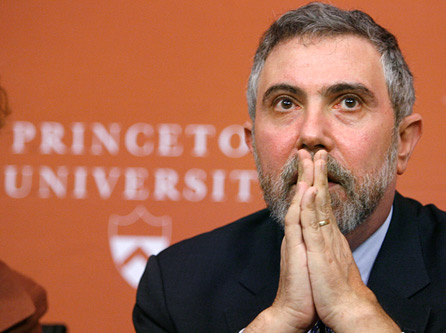Krugman’s Fear Mongering
Paul Krugman's latest column, "Depression and Democracy," is simply bizarre.
Paul Krugman‘s latest column, “Depression and Democracy,” is simply bizarre.
He begins with this assertion:
It’s time to start calling the current situation what it is: a depression. True, it’s not a full replay of the Great Depression, but that’s cold comfort. Unemployment in both America and Europe remains disastrously high.
Now, Krugman is a Nobel Prize winning economist whose claim to fame is research on the Great Depression. I have neither of those credentials. Still, words mean things and depression is not simply a period of high unemployment. Indeed, according to the National Bureau of Economic Research–the US government agency that officially declares these things–the recent recession lasted from December 2007 to June 2009. So, not only are we not in a depression, we’re not even in a recession but rather in a period of slow expansion that’s lasted more than two years.
From there, Krugman correctly assesses that “the crisis of the euro is killing the European dream. The shared currency, which was supposed to bind nations together, has instead created an atmosphere of bitter acrimony” and continues his long-running theme, which I find persuasive, that the transatlantic elite consensus that “austerity” is the solution to the current stagnation is dangerously wrongheaded.
Next, though, he goes off the deep end in declaring a crisis in European democracy on the basis that some fringe parties are getting votes in some countries with electoral rules that promote large numbers of parties and that Hungary is showing troubling signs.
A proposed election law creates gerrymandered districts designed to make it almost impossible for other parties to form a government; judicial independence has been compromised, and the courts packed with party loyalists; state-run media have been converted into party organs, and there’s a crackdown on independent media; and a proposed constitutional addendum would effectively criminalize the leading leftist party.
Taken together, all this amounts to the re-establishment of authoritarian rule, under a paper-thin veneer of democracy, in the heart of Europe. And it’s a sample of what may happen much more widely if this depression continues.
I’m not pleased, either, that the economic crisis is fueling resentments and giving rise to fringe parties and a man on horseback mentality. But that’s hardly unusual and seldom a recipe from long-term damage. And the notion that Hungary is somehow “the heart of Europe” is laughable. It has spent almost all its history under one dictator or another.
Things are undeniably bad. The failure of leadership in Europe could well send us into another economic spiral. The failure of leadership in Washington, too, is deeply concerning. And, yes, all of this has led to a poisonous political climate. But we don’t need wild hyperbole from respected voices like Krugman.







The amount of this I’m encountering seems to be increasing. One possible analogy is if some baseball scholar were to come along and claim that according to his measure the Red Sox won the 2011 American League pennant. The problem is that that’s not what the umpires said.
Like it or not the NBER is the umpire on recessions. The present circumstances are unfortunate and I don’t want to minimize its impact on individuals and families. But those circumstances are a pale shadow of the Great Depression of the 1930s by any reasonable measure, especially employment.
I think that the gripe about the EMU’s elites thwarting democracy and the inevitability of a reaction is legitimate but it’s hardly new. The EMU’s elites have been thwarting democracy since the inception of the euro and the euro’s problems are hardly a surprise—any number of people predicted them beginning before its creation.
Wait…the Red Sox didn’t win in ’11???
In reference to your first point about the official end of our present “recession” being past, you are of course correct, sir. But the upturn that corresponds to this and would have ‘officially’ ended the “Great Depression” was in 1933. The fairly steady upward trend in business activity, stock prices, GDP and etc from 1933 to ’37 (when there was a decrease in deficit-spending and ‘stimulus’ that created a transient down-turn — for which the word “recession” was invented, Dr Krugman informs us) was still “The Great Depression” to those who lived through it. It is not playing clever word games to call the lingering depressed economic outlook a “depression” today. Indeed, to use the NBER’s official ‘end of the recession’ date to call the current poor economy something other than (to pick one word) a “depression” is silly and contentious.
And to look at an epochal change in the world economy and to see along with it changes in political structures is what intelligent people do. Dr Krugman avoids a ‘Godwin’s Rule’ violation but does publicly worry about political parties that incorporate paramilitaries. Seems straightforward to an unbiased reader. You seem to disagree, which is reasonable. But I do not see your reasoning. Are you saying that the political realignment that accompanies a “depression” CANNOT or WILL NOT lead to fascist-type politics?” You’ve never seemed like a cock-eyed optimist before. Care to defend your position that a rotten economy will not tend to produce authoritarian politics? Or is this just an assertion on your part that I can ignore?
So Dave, who did you vote for in the NBER elections? 😉
(No, they do not rule me.)
Understood. Your view is that when and whether a recession occurs should be determined by plebisicite.
Speaking more generally, we are at a glass half _____ moment.
Perhaps this is more a fork in the road than we have been at in some time. US finances have been bad since the 2007-2008 crash, but we’ve made do with a sluggish recovery. NBER calls it over when the contraction stops. That’s their world-view. They don’t worry, say, about when households recover:
Household Net Worth declines $2.4 Trillion in Q3
So, we’ve been “recovering” weakly, and after a fashion, and in parallel we’ve got the slow-motion car crash happening in Europe.
We don’t know what will happen, but current events on their face are not good. IMO Krugman called attention to that, with some over-the-top Hungary stuff as blog-bait.
@Dave Schuler:
I think there are half a dozen reasonable ways to argue our position in expansion, recession, and recovery.
I am not actually arguing that a different, single, pedantic view be adopted.
Picking a nit (I am, that is)…
“And the notion that Hungary is somehow “the heart of Europe” is laughable. It has spent almost all its history under one dictator or another.”
One could read this, “Taken together, all this amounts to the re-establishment of authoritarian rule, under a paper-thin veneer of democracy, in the heart of Europe” to mean (by ‘heart’) in the center of Europe, not ‘heart’ in the sense of the essential, etc. This is how I read it.
@sam:It sounds similar to neocon claims of the importance of a democracy in the geopolitical center of the Middle-East, that Iraq has added value because of its location.
@JohnMcC: We’ve had two depressions in the last 150 or so years. This ain’t one of them. I’m not simply being technical here; there are definitions that just haven’t come close to being met.
During periods of even relatively minor economic downturn, nationalism and even quasi-racism tend to surge. In electoral systems that reward fringe parties, that phenomenon manifests electorally. Even France and Germany have occasional spikes in quasi-fascist party support during tough times. I’m just saying that this happening in Hungary isn’t a bellweather for the Continent.
@john personna: As I note, the core concerns Krugman points to are quite reasonable. I share them. I just think he leaps to absurd conclusions.
Yeah, that’s pretty much it, PD.
@Dave Schuler: The NBER is the umpire for technical recessions not depressions or de facto recessions which occur when growth is so weak the economy continues its slide.
Krugman may know the Great Depression, but his knowledge of the rise of the NAZI party is lacking.
I think it would generally be accepted that if Germany had been able to foster a center-right party within the Wiemar Republic, the world would not have gone to war. A majority of votes in the Wiemar Republic consistently went to parties that were opposed to the Wiemar Republic, split between parties on the Left and the Right. It was the weakness of center politics that was the problem.
Krugman strikes me as playing the same partisan game as people comparing center-left parties with Communists.
@James Joyner:
Actually we had six depressions from 1837 to 1929, interestingly all while on the gold standard and all immediately following significant budget surpluses.
FYI there is no hard definition for depressions, no book or organization which determines whether a downturn gets the Big Label.
If this is a depression then we probably need a new word for what happened in the 1930’s because that was much worse in every respect that I can think of.
To understand Krugman’s hyperbole, you’ve got to remember two things.
1. Like other folks who are legitimate intellectuals in other fields, Krugman’s smarts on economics are not at all transferred to the world of politics. He doesn’t really understand it and commonly confuses the way he thinks things should be with how they actually are.
2. Krugman is largely a supporter of our current global economic system, he just thinks it needs smarter people running it (which links back to his at time willfully obtuse political analysis).
Mike
I think you guys underestimate Krugman’s self-awareness when it comes to blog-trolling.
Its like any other field- who gets to determine when the Mesozoic Era began or ended? Who gets to decide when a growth is benign or tumorous? How did they label the Chrysler Bldg Art Deco and not Moderne?
“People Who Study This Stuff” is the who, and “by popular consensus” is how.
Which is to say, if Krugman wants to use economic terms, he should play by the rules that his peers use.
Depression is a word that has two meanings, one economic (and has pretty objective definitions) and one political, (which is pretty hazy).
Economically it sounds like he is dead wrong, but politically there are some similarities and parallels.
I would only object on the grounds that it is a form of Godwining the dialogue- the injection of so loaded a term serves some short term objective but adds so much chaff and distraction it actually harms a longer term goal.
@Liberty60:
As regards there being an objective meaning for “depression,” I give you Wikipedia:
@Ben Wolf: Re: definition of depression.
If you’re unemployed it’s a recession. If I’m unemployed it’s a depression.
The Nazis were hardly the only nationalistic party to seek power in the 1930s.
O/T
Good to see you name on a thread post, James.
I think of you often, and continue to wish you the best through these difficult times.
This is to some degree playing wordgames. What exactly does a party have to do to lose the label center-right? Undermining the rule of law (retroactive penal laws; “Kin Custody” application; laws targeted specifically at opposition groups etc.) is not very “center” in my world.
If you want to stretch it that far you could probably call the NSDAP center-right. One of their biggest draws to the conservative base was the dual promise of keeping the Communists out and being the only force capable of restraining the “radical” SA.
I find I am somewhat shamed by Ms Jan; I actually had intended to express my warmest thoughts to you above. May you find a joyful heart despite the terrible loss of your wife. And keep blogging when you can; I enjoy the debate on this site and appreciate your work.
This is not a normal post-war recession. What we are going through now is structurally different from the post-WW2 recession. Those recessions were caused by excessive production getting ahead of demand and causing everything to slow down until the imbalance could be corrected.
This is different, this is a debt bubble popping. This is not caused by excessive production, it is caused by excessive debt. Debt bubble downturns happen much less often than recession but they last longer. The last one was the 30’s, before that there is the long depression that started around 1873 and ran until 1896.
They are NOT just really bad recession. The long depression had positive economic growth for about 45% of months during the depression. The all time records for economic growth in an month for the US economy were set during the long depression. But over all, the economy was in recession for more months than it grew and the whole period was a deflationary period of low growth.
Sound familiar?
The Great Depression is Great because it was really, really bad. Spectacularly bad. Great big smoking whole in the ground bad. For economic meltdown, it is hard to see how anything could be worse than total cratering of the banking system and stock market down 90%+, unemployment north of 25% when there is no unemployment insurance, no social security or food stamps or medicare. Losing a total war with your cities being bombed into rumble (goodbye depression, hello WW2! ) would be worse but that is about it. It is a friggin miracle democracy survived the great depression and the global war it spawned much less capitalism. (thank you FDR)
To say that because this is not as bad as the great depression, it cant be a depression is as wrong as saying Afghanistan is not a real war because it is not as bad as WW2.
What we are going through now is very much like the long depression of 1873 to 1896. Low growth deflationary economy with large scale de-leveraging. You dont have to call it a depression but it sure aint biz as usual. And the usual post-WW2 recession fighting tools of money supply management are NOT going to work.
I don’t believe that Krugman is actually known for his expertise on the Great Depression. His work on international economics and Japan’s lost decade are primarily what his expertise is considered to be. His nobel was for his work on New Trade Theory and New Economic Theory.
What Krugman is known for, however, is being the biggest left wing crank to ever grace the pages of a major newspaper. If Krugman didn’t have a perch on the Times, no one outside of Economic academia would know who he was. Nor would they care.
@Moderate Mom: Why do you say Krugman is a crank? I hope this isn’t simply because he doesn’t say things you want to hear.
When I read the word “crank” I think of people like a) the Birthers, b) the Truthers, c) the “free-energy” loons, or d) those people insisting that they’ve managed to outdo Einstein. (Ask me about the fruitcake who walked into my work one day….)
Since Krugman’s abilities in economics have been awarded by his colleagues with a Nobel in his particular discipline, I don’t think you have any basis for calling Krugman “a crank”, at least not for his economic theories.
And I haven’t seen Krugman postulate any of the wackier ideas that usually cause Nobel laureates to get labeled cranks–e.g. Shockley and his ideas on I.Q. So unless you can identify a particular theory that Krugman has pushed and which is totally out of the mainstream, my opinion is that your use of the word “crank” is simply hyperbole and an attempt to lower the reputation of a very good economist.
So please indicate: what has Krugman said that causes you to label him a “crank”?
Or the other way to look at a depression is a sustained period of massive underperformance of economic activity compared to trend. Right now we are a cumulative several trillion dollars under trend lines since Q3 of 2007.
Isn’t this true of all economists?
Erm… a depression is not just a super-recession. The US economy did not shrink every quarter between 1929 and 1940. Indeed, there was economic growth in the US for most of the Great Depression. It just wasn’t fast enough. So “we’re not even in a recession” is not an argument that we are not in a depression.